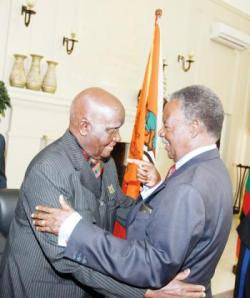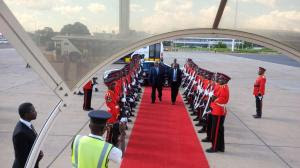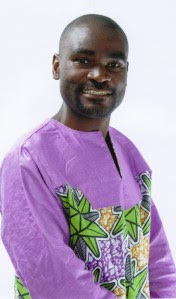
There is no doubting that the 30th May “midnight” court ruling in Malawi has significant implications for Zambia. In 2016, Zambia is likely to face a somewhat contentious election. That being the case, we have a lot to learn from the way Malawi high court handled the electoral petition presided by Mr. Justice Kenyatta Nyirenda. I do have issues with Mr. Nyirenda’s legal reasoning. However, I also recognize that controversial as it may be, the ruling has some positive implications for Zambian courts.
Justice Kenyatta Nyirenda of the Malawi High Court was called upon to decide on at least three questions. First, he was to rule on whether to hold the Malawi Electoral Commission (MEC) in contempt. These contempt charges emanate from injunctions and counter-injunctions filed during the ballot count. Second, he was called to rule on whether the law did in fact give the MEC power to conduct a recount of electoral ballots to ascertain a correct picture of the outcome. If this second issue is answered in the affirmative, the next question was whether MEC could extend the period of recounting beyond the statutorily stipulated eight days. As fate would have it, the 8 days was supposed to elapse that Friday evening. The MEC and an opposition party, the Malawi Congress Party (MCP) had applied for this eight-day period to be extended so that a better recount of votes could be conducted.
Justice Nyirenda is a 1986 graduate of Chancellor College at the University of Malawi. President Joyce Banda appointed him as judge in October 2012. Before 2012, Nyirenda served a couple of years as Senior Legal Officer for the Southern Africa Development Community (SADC). He has also worked in legislative drafting in both Turks and Caicos Islands and Kenya.
The little background information I have provided is important in so far as it helps us to situate and contextualize the milieu from which Justice Nyirenda made his “midnight” ruling. Any court case is as good as the judge hearing it. From his reasoning we could ask better questions as to why he decided to reason a certain way.
To answer the first question, Judge Nyirenda discharged the contempt charges against the MEC. He correctly held that the applicants had not provided all the information needed to proceed with contempt hearings. The contempt charges for the MEC are quite unusual here because it does appear like the applicants had wanted to stop MEC commissioners from doing exactly what the law asks them to do: to count and recount votes after an election.
Judge Nyirenda obviously, did not want to hold MEC Commissioners in contempt and then worked backwards to find the reasons why he should not. This strategy did seem to work well. This should not come as a surprise. It would take unusual circumstances to hold a group such as the MEC commissioners in contempt of court. This is the same principle I saw working with Judge Eddie Sikazwe here in Zambia last week when he refused to cite Nevers Mumba and 45 other NEC members for contempt. Holding groups in contempt of court is too messy and judges are generally reluctant to do so.
On the second question, Justice Nyirenda answered in the affirmative. The MEC had the power to count and recount the votes. He interpreted the enabling legislation and the constitution. He then held that indeed counting and recounting of the ballots was within the perimeter of the MEC. This is a very important principle in administrative law. The power of an administrative body is primarily derived from the mothering statute.
Judge Nyirenda, however, left the most bizarre answer to the third question. If indeed the constitution and the statutes do empower the MEC to conduct a recount, can the MEC apply to court to have this period extended? He answered “no”. At issue here was the provision of the statute. Statute states that the MEC is supposed to announce the election results within “eight days” of an election. Since the last day of the election was May 22, the eight days were going to elapse on May 30. In ruling that the results had to be released, the judge relied on the “literal rule” of legislative interpretation. He held that since the statute says election results should be announced in eight days, there was nothing he could do as a judge to extend that timeline. He claimed that the MEC was bound to follow this timeline and announce. The judge then made a philosophical point, “As a judge my role is not to make law, but to interpret it.”

Judge Nyirenda’s holding on this third question is controversial for several reasons. First, he does not acknowledge the fact that the MEC had spent much of the eight days in court rather than in counting the votes. The judge could still have discredited some of that time so that the eight-day deadline begins to count only after his court ruling on May 30. Second, Judge Nyirenda’s ruling would lead to absurd outcomes. What good is this power to recount the vote, if it had to be done by May 30, the very day that he was delivering the ruling? Isn’t it obvious that it would be self-defeating for the MEC to be given broad power and yet have it restricted to just one hour? Third, Judge Nyirenda, as a skilled legal drafter himself, exploits the “literal rule” and relies on it to emphasize that the results should be announced within the stipulated 8-days. Perhaps, Judge Nyirenda needed to be reminded that the literal rule is hardly the best tool to use when interpreting text that has constitutional implications. The MEC was not asking for time to manufacture results. It was asking for time to verify the results. It should not take rocket science to know that the activity of verification might need a little more time, especially in the atmosphere as adversarial as that particular election.
Notwithstanding, the contentious issues concerning the third element. The positive aspect of this ruling is the fact that the court did not bow to pressure from a sitting president. The court showed independence and a clear commitment to follow the “letter of the law”. I have my own doubts about Justice Nyirenda’s reasoning. However, what I do not doubt is that Zambian judges might just find his courage insightful when their turn comes in 2016, or perhaps before that.

 JOIN DRIVERN TAXI AS PARTNER DRIVER TODAY!
JOIN DRIVERN TAXI AS PARTNER DRIVER TODAY!













Zambia n Malawi ar similar in evrythng bt in this case we ar far more better than Malawi
Hope so